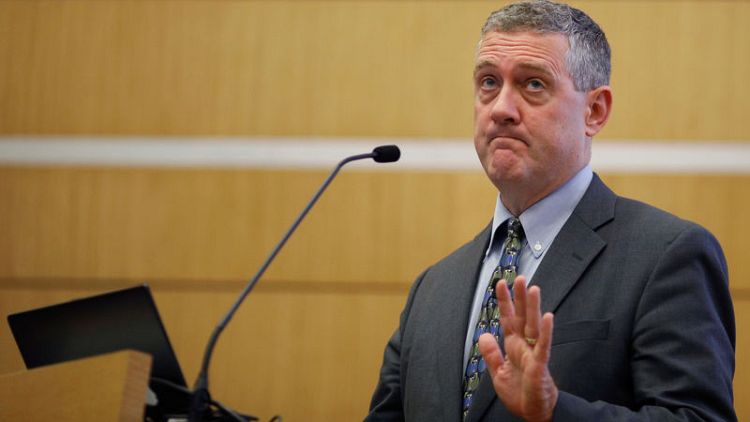WASHINGTON (Reuters) - The Federal Reserve is likely to miss its 2 percent inflation target for an eighth straight year in 2019, a further sign the U.S. central bank's recent round of rate increases should end, James Bullard, president of the St. Louis Federal Reserve Bank, said on Thursday.
Bullard said the pricing of inflation-protected securities showed that investors late last year began lowering their expectations about inflation, and now see the Fed missing its 2 percent target not just this year but for years to come.
The Fed "needs to tread carefully going forward," Bullard said in remarks prepared for delivery at St. Cloud State University in Minnesota, his alma mater. Rate increases so far have "already been sufficiently pre-emptive over the last two years to contain upside inflation risk," said Bullard, who is a voter on interest rate policy this year.
The Fed raised rates four times last year, but now appears to be on hold.
Through much of last year Fed officials felt the years of "accommodative" policy had finally given some traction to inflation and raised it close to target. Meeting or exceeding the targeted inflation level is a core goal of policymakers, who regard a low but steady rise in prices as a sign of economic health, important to keep wages and investment on track.
While the Fed in its last policy statement noted "muted" inflation pressures, it said it was "most likely" that inflation would remain near the Fed's target.
Bullard has been among the most sceptical about that, arguing that a standard economic notion -- that low unemployment would lead to inflation -- has not been proved out in the data during years of falling, and now historically low, levels of joblessness.
The Fed's preferred measure of inflation has averaged about 1.6 percent since 2012, roughly what some inflation-protected securities indicate is the expected level in the years ahead.
"These correlations have broken down during the last two decades, so they no longer provide a reliable signal,” Bullard said in his prepared material.
Bullard does not feel interest rates should rise above the current range of between 2.25 and 2.5 percent.
(Reporting by Howard Schneider; Editing by Leslie Adler)



